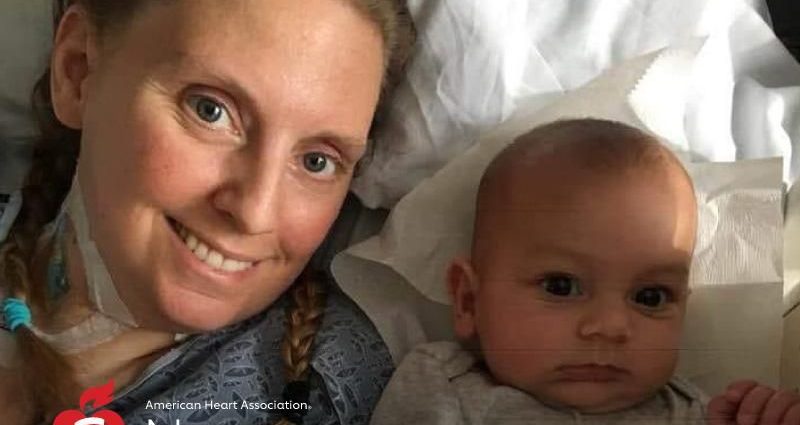THURSDAY, July 29, 2021 (American Heart Association News) — In her third trimester, Kristy Novillo struggled to give tours of the Redmond, Washington, child care center where she worked as a director. Walking and talking at the same time left her out of breath.
Two months after delivering her son, Dominic, Kristy was still gasping for air. Her primary care doctor suspected allergy-induced asthma and sent her home with a few inhalers.
A month later, Kristy and her husband, Jorge, went camping along the Olympic Peninsula. Kristy was so out of breath she could barely climb the three steps into their new trailer.
Jorge took her to the ER. A scan found fluid in her lungs. Doctors diagnosed her with pneumonia and prescribed a strong antibiotic.
When Kristy didn’t get better, she went back to her primary care doctor. The discovery of an abnormal heartbeat led her to see a cardiologist, which in turn led to another diagnosis: peripartum cardiomyopathy, a rare form of heart failure that happens during late pregnancy or within several months of giving birth. The cardiologist scheduled her for an angiogram that would provide more details.
Later that day, she sat on her couch feeling suddenly hot, then cold. Her mother took her blood pressure. It was dangerously low. Then Kristy started to cough up blood. Her mother dialed 911.
At the hospital, doctors determined Kristy was in cardiogenic shock – her heart couldn’t pump enough blood to power her body.
Further tests showed Kristy was in end-stage heart failure. A heart valve wasn’t fully closing, allowing fluid to build up in her heart and lungs. She underwent emergency surgery to implant a device in the left side of her heart to help pump blood.
“They said it was the only option for survival,” Jorge said.
It was also temporary. Once stable, Kristy would need a new heart.
“When I heard I needed a heart transplant, it was a total, complete shock,” Kristy said. No one in her family had a history of heart disease. “I was devastated. It sounds so scary. The thought that someone else had to die for me to live was daunting.”
The procedure to implant the device seemed to go well. Then, the next morning, Kristy couldn’t move her left hand or foot. She’d had a stroke during surgery.
She spent three weeks in the intensive care unit and two additional months in the hospital. When the device in the left side of her heart stopped working, doctors implanted one in the right side. Then she needed a mechanical pump inserted in her heart. During that operation, her heart stopped; doctors restarted it by squeezing it with their hands.
“Your priorities change, your outlook changes,” Jorge said. “You focus on being alive and being the best human you can and you realize you don’t have as much time as you think you do.”
Jorge brought Dominic to the medical center so mother and son could nap together. Kristy also managed to keep her sense of humor.
When co-workers noticed her watching a Ryan Reynolds movie more than once, they bought a life-sized cutout of the actor for her hospital room. Kristy often placed it by her door at night to surprise the night nurses.
Finally, Kristy was well enough to go home to wait for news of her transplant. The call came about a year after her first heart surgery. She went home less than two weeks later.
“I was determined not to have another three-month stay,” she said.
At home, Kristy struggled with not being able to care for herself and Dominic. It wasn’t just the transplant that weakened her; she also was still recovering from her stroke. Therapy helped her come to terms with letting others help.
Almost two years after her heart transplant, Kristy feels like a new person. She can walk short distances with a cane and help make dinner and get groceries, and she’s working to strengthen her left hand.
“Everything’s gotten better since the transplant,” she said. “I had so much anxiety before that. With that behind me, I can breathe a huge sigh of relief.”
She worries about how being apart from Dominic when he was first born will affect him. But so far, it seems the experience has made him more compassionate.
“If I drop something, he stops what he’s doing and comes over to help,” Kristy said.
Looking back, she said, she’s grateful for her stroke because it forced her to rest. She couldn’t jump back into her regular routine after the initial three-month hospital stay.
“It’s something I don’t think you’ll hear most stroke survivors say, but in all honesty, I believe that my stroke might have saved my life,” she said. “I firmly believe that having a stroke really forced me to slow down and helped me make it to transplant.”
American Heart Association News covers heart and brain health. Not all views expressed in this story reflect the official position of the American Heart Association. Copyright is owned or held by the American Heart Association, Inc., and all rights are reserved. If you have questions or comments about this story, please email editor@heart.org.
By Deborah Lynn Blumberg
Copyright © 2026 HealthDay. All rights reserved.

